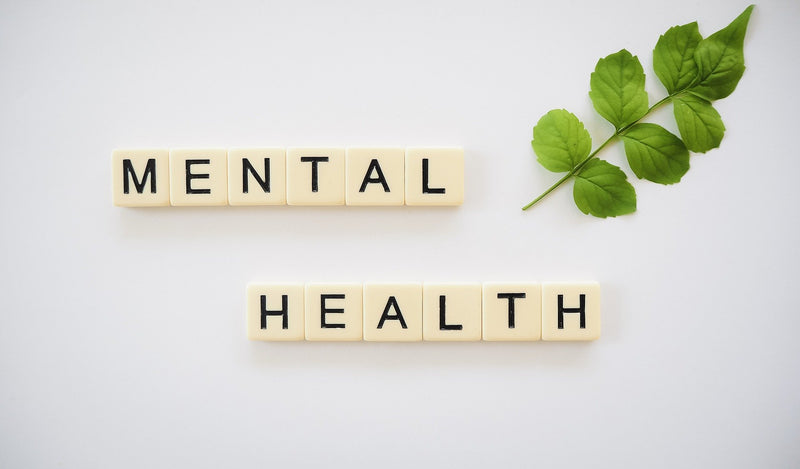Managing Mental Health During the Menopause

Managing mental health during the menopause
We all go through times when we feel stretched too thin, when juggling work and family and all our other commitments leaves us feeling tired and hopeless, yet unable to articulate how we feel or ask for help. During the menopausal years, when anxieties and uncertainties are running rampant, it's perfectly normal to find yourself feeling this way even more, as fluctuating and declining hormone levels can often cause anxiety, mood swings, low self-esteem, and even depression.
Because of the stigma surrounding mental health issues, we can often be quite dismissive of our symptoms, chalking them up to being "bad days" or "one of those weeks", or worst of all, "I'm just being silly". You absolutely are not; medical science has proven again and again that the menopause and perimenopause can have a significant effect on your mental health. In fact, studies have shown that the risk of developing depressive disorders is up to 5 times higher during the perimenopause than during the premenopausal years. However, the studies also show that these conditions tend to stabilise and subside as one progresses into the postmenopausal years.[1]
Awareness and acceptance of the mental health concerns that may occur during this time, as well as knowing that help is available, are important factors in dealing with these concerns. Plus, the simple fact that you are reading this means you are informing and preparing yourself to face any mental health challenges that come your way, and that will make a big difference.
What causes low mood during menopause?
During the perimenopause and the menopause, your oestrogen levels oscillate and your progesterone levels gradually decrease. These fluctuations in your hormones don't happen in isolation, but result in many other delicate balances in your body (that the former usually help maintain) being thrown off-kilter. A key one of these balances is the production of serotonin, a neurotransmitter that plays a big role in regulating mood, anxiety and fear, as well as sleep, appetite and aggression. And, the more anxious or stressed you become, the more your serotonin production is affected[2]; this could become a vicious cycle if it isn't managed well, leading to worsening depression.
Depleting serotonin levels can also be caused by other factors such as stress, lifestyle, poor diet, genetic and digestive issues, certain medications, substances including caffeine, nicotine and alcohol, and insufficient exposure to sunlight. Eliminating or changing these contributing factors wherever possible may have a significant positive effect on your low mood.[3] This is why perimenopausal and menopausal women are often given what seems like repetitive advice to stop smoking, cut down on caffeinated drinks and alcohol, eat healthier, and adopt mindful, stress-relieving practices – these solutions are the first line of defence in keeping your serotonin production as stable as possible.
Perimenopause and anxiety — what’s the link?
Many women notice a rise in anxiety-related issues during the perimenopausal stage; as the transition to the menopause begins to cause many changes in their bodies, it also has an effect on their mental state. While some may dismiss this as being a popular myth, the data from numerous clinical and community-based studies indicate that anxiety and depression are more frequently reported in perimenopausal women (compared to premenopausal women), suggesting that the perimenopausal period does indeed bring with it an increased susceptibility to depression.[4] Some studies have also pointed to increased risk for women with a history of anxiety or depression, yet most also show a significant decrease in risk in the postmenopausal years.
Recently, a lot of research on mental health during the menopause has been focused on trying to understand exactly why the perimenopause is such a high-risk period for mental health, and several theories have emerged. The oestrogen withdrawal theory suggests that fluctuating oestrogen levels affect the levels neurotransmitters such as dopamine, endorphins, and serotonin in the brain, and thereby affect mood and increase susceptibility to depression. The domino theory suggests that mood changes are caused by the sleep disturbances and fatigue which are a result of the hot flushes and night sweats which are a result of fluctuating oestrogen levels. The psychosocial theory suggests that is not biological, but a psychological response to changing roles, relationships, responsibilities and lifestyle.
While all these theories are valid arguments, the likelihood is that most women who experience mood changes and depressive symptoms do so due to a combination of these factors.[5] A full assessment by a medical professional such as your GP will help you understand your particular case and find solutions that will work for you.
How to improve your mental health during the menopause
There are many things you can do to keep your mental health in check during the menopause and perimenopause, more natural, nutritional solutions that may help you stay balanced without the need for more clinical solutions such as antidepressants and HRT.
Food that can help boost your mood
The first step towards a healthier mood is to stop putting bad things into your body. Baddies such as refined sugar, junk food and others high in salt and saturated fats, caffeinated and sugary drinks and alcohol, all take their toll on your system. Upgrade your diet by staying well hydrated and incorporating lots of fresh vegetables and fruit, whole grains, good quality proteins and dairy. Dairy products that are high in calcium and vitamin D are not just beneficial for your bone health; they also contain glycine, an amino acid found primarily in protein-rich food that helps promote deeper sleep, which in turn promotes better mental health.[6] Soy-based products rich in isoflavone can also help with many of the physical symptoms of the menopause that take a toll on your mental health. And of course, the occasional square of dark chocolate (which may be an acquired taste for some but is vastly more beneficial than other sugary sweets) will go a long way in boosting your mood!
Can exercise help?
The short answer is, of course! Exercise helps release serotonin and dopamine and is known to boost your mood within minutes. Motivating yourself to get started is often the biggest hurdle, but once you establish a routine you enjoy, you'll find you can't go without it. Don't feel pressured to do high-intensity workouts unless you enjoy them; low- to moderate-intensity exercise like walking and running, pilates, cycling, and aerobics are all good ways to promote better sleep, mood, and overall health. When you're feeling low, try a more fun form of cardio such as Zumba or dancing to get energised, or an lively game of tennis if that's more your style. Another great form of exercise to try (if you haven't already!) is yoga, which not only stretches and tones key muscle groups but also helps relieve stress and anxiety.
Alternative remedies and medical solutions
There are many alternative remedies that could help improve the physical symptoms the contribute to your low mood, and one of the most effective ones is sage.[7] Taking a grape seed extract supplement daily has been shown to reduce hot flushes whilst promoting better sleep and lower rates of depression.[8] Aromatherapy is another natural alternative, particularly lavender essential oil which has been shown to lessen the frequency of hot flushes, improve quality of sleep, and help reduce stress and depression.[9] You may also find counselling and other kinds of therapy helpful; therapies such as cognitive behavioural therapy (CBT) can help lessen your physical symptoms while helping you gain control of anxiety and depression.[10] If these options don't work for you, your GP can help you seek a medical solution, whether that's HRT or birth control or in some cases even antidepressants. Try to keep track your symptoms and feelings, and have a detailed chat with your doctor to decide which solution could work best for you and what your next steps should be.
A good mood often depends on good sleep. If you after better sleep, check out Become's collection of sleep solutions that's engineered to help you stay cool, dry and fast asleep all night long. Shop sleepwear collection
You can also explore our Meno Guide to discover more advice and get the support you need to take on the ups and downs of the menopause.
Image credit: Total Shape
[1] https://www.ncbi.nlm.nih.gov/pmc/articles/PMC6226029/
[2] https://www.integrativepsychiatry.net/seritonin-and-seritonin-deficiency.html
[3] https://www.integrativepsychiatry.net/seritonin-and-seritonin-deficiency.html
[4] https://www.ncbi.nlm.nih.gov/pmc/articles/PMC5248425/
[5] https://www.ncbi.nlm.nih.gov/pmc/articles/PMC2882813/
[6] https://www.ncbi.nlm.nih.gov/pubmed/25660429
[7] https://doi.org/10.1007/s12325-011-0027-z
[8] https://www.ncbi.nlm.nih.gov/pubmed/24518152
[9] https://www.ncbi.nlm.nih.gov/pmc/articles/PMC3159017/
[10] https://www.nhs.uk/conditions/cognitive-behavioural-therapy-cbt/
More Posts
-
Become: Behind the ...
In honor of Earth Day and Fashion Revolution day that both take place this week, we'd like to take the opportunity to share more of our story "beh...
Read More -
Embracing Mindfulne...
Entering (peri) menopause brings with it a host of physical, emotional, and mental changes. From dealing with hot flashes to mood swing...
Read More -
Become Featured on ...
We're thrilled that our Anti-Flush clothing was featured on The Quality Edit in their 'Add To Cart' column is a rundown of our their style edito...
Read More







Comments
0 Comments
Leave a Comment